An investigation in to the impacts of out-of-class English activities on the English major students’ achievement at military science academy
This paper describes an in-depth investigation of how out-of-class English activities can be seen
to positively influence the English major students’ achievement at Military Science Academy. The
present paper is based on the data collected from 90 third-year English major students via the tools
of a questionnaire, semi-structured interviews, and the students’ language diaries. The research
results demonstrate that out-of-class English activities are indeed a platform for the students to
develop their language performance, creativity, critical and analytical thinking, problem-solving
skills, self-confidence and maturity.
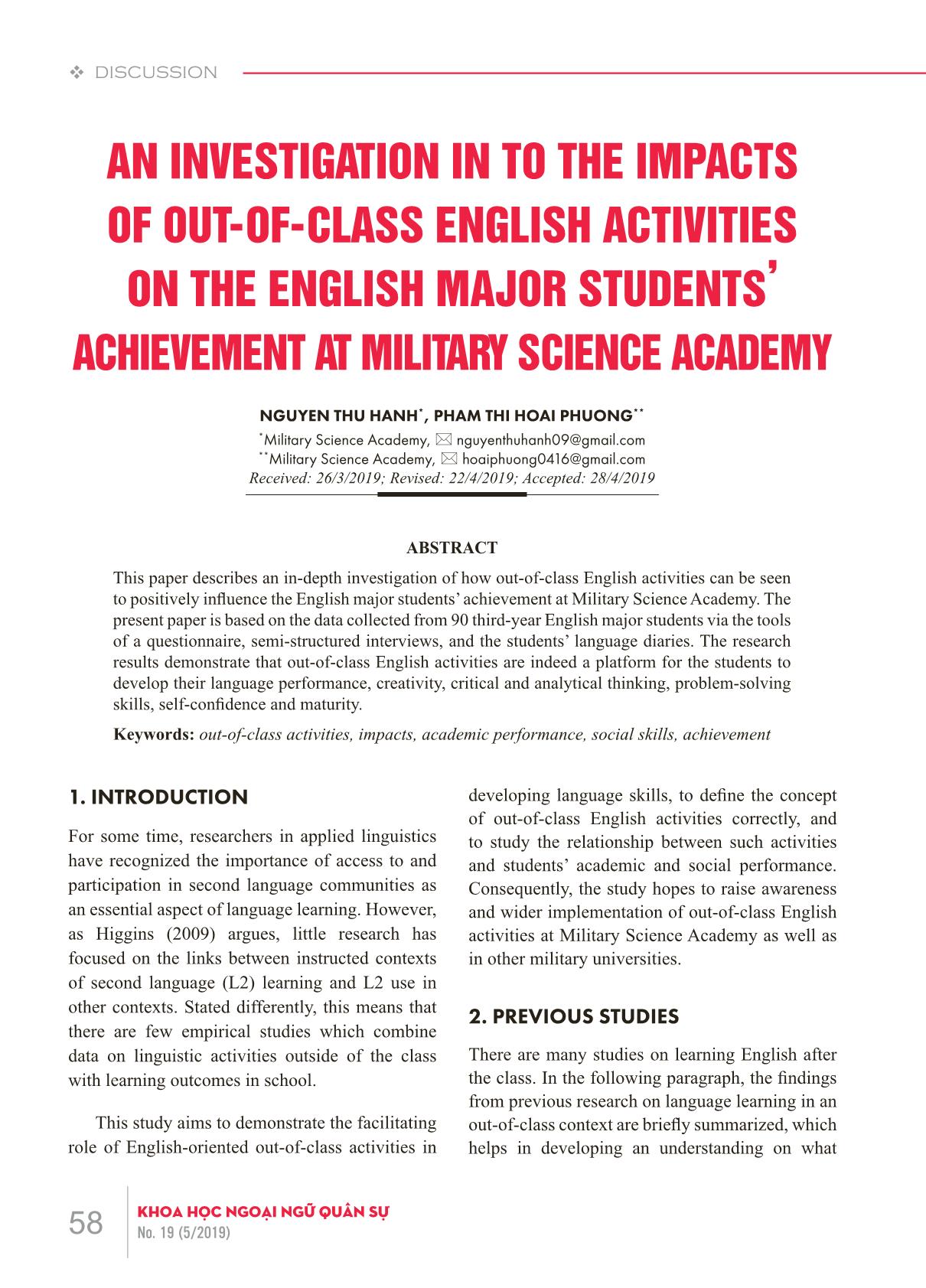
Trang 1
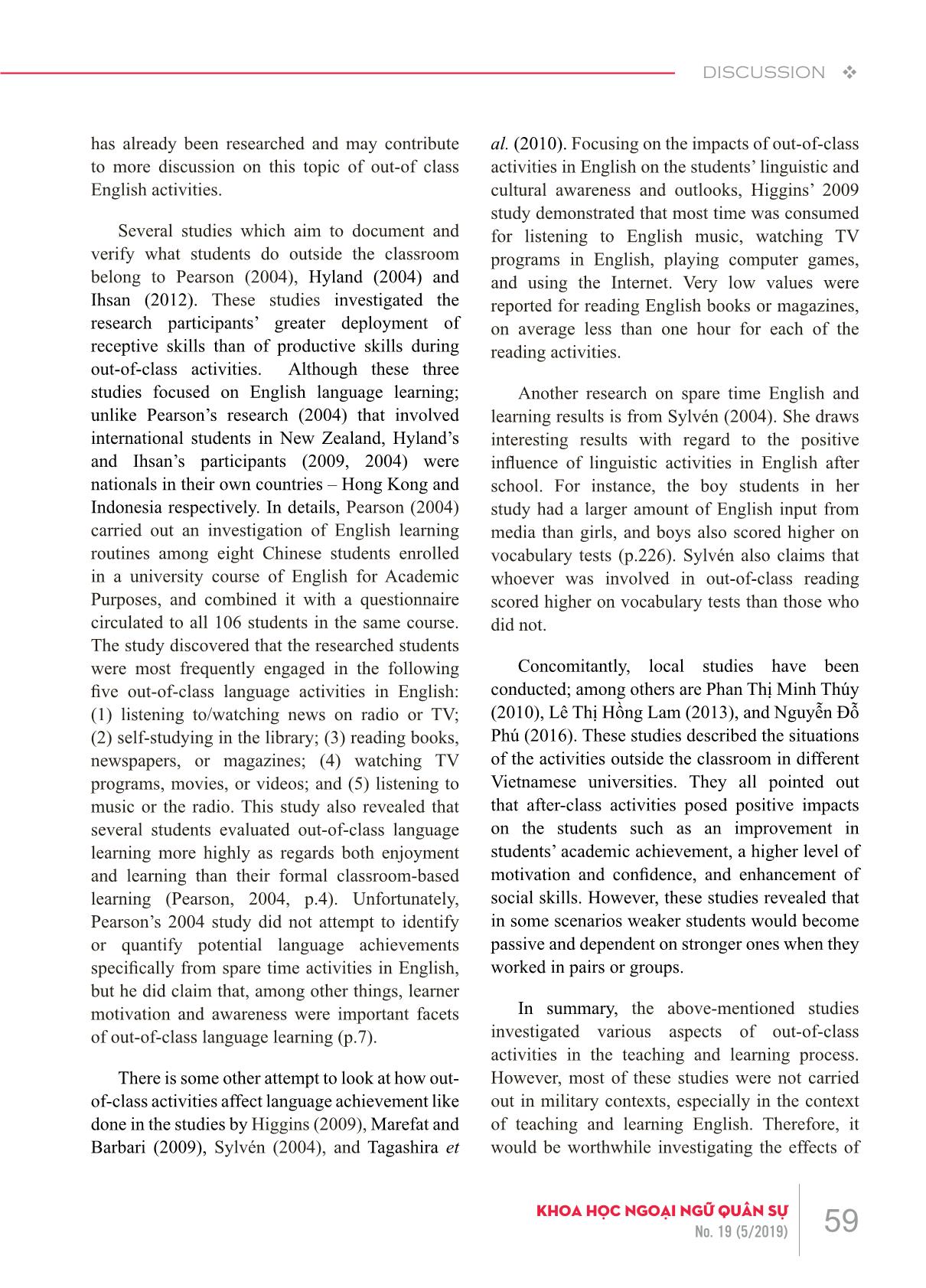
Trang 2
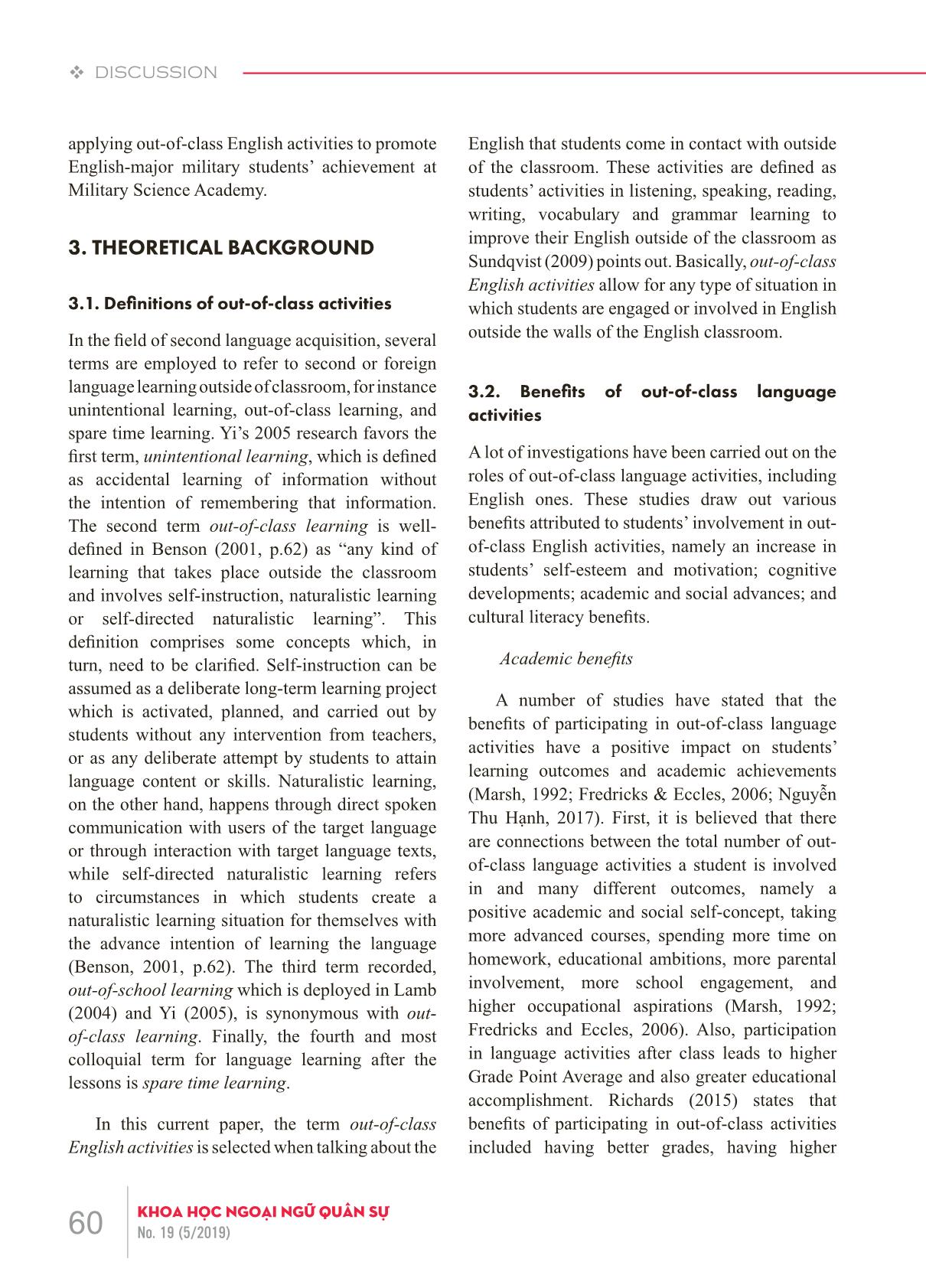
Trang 3
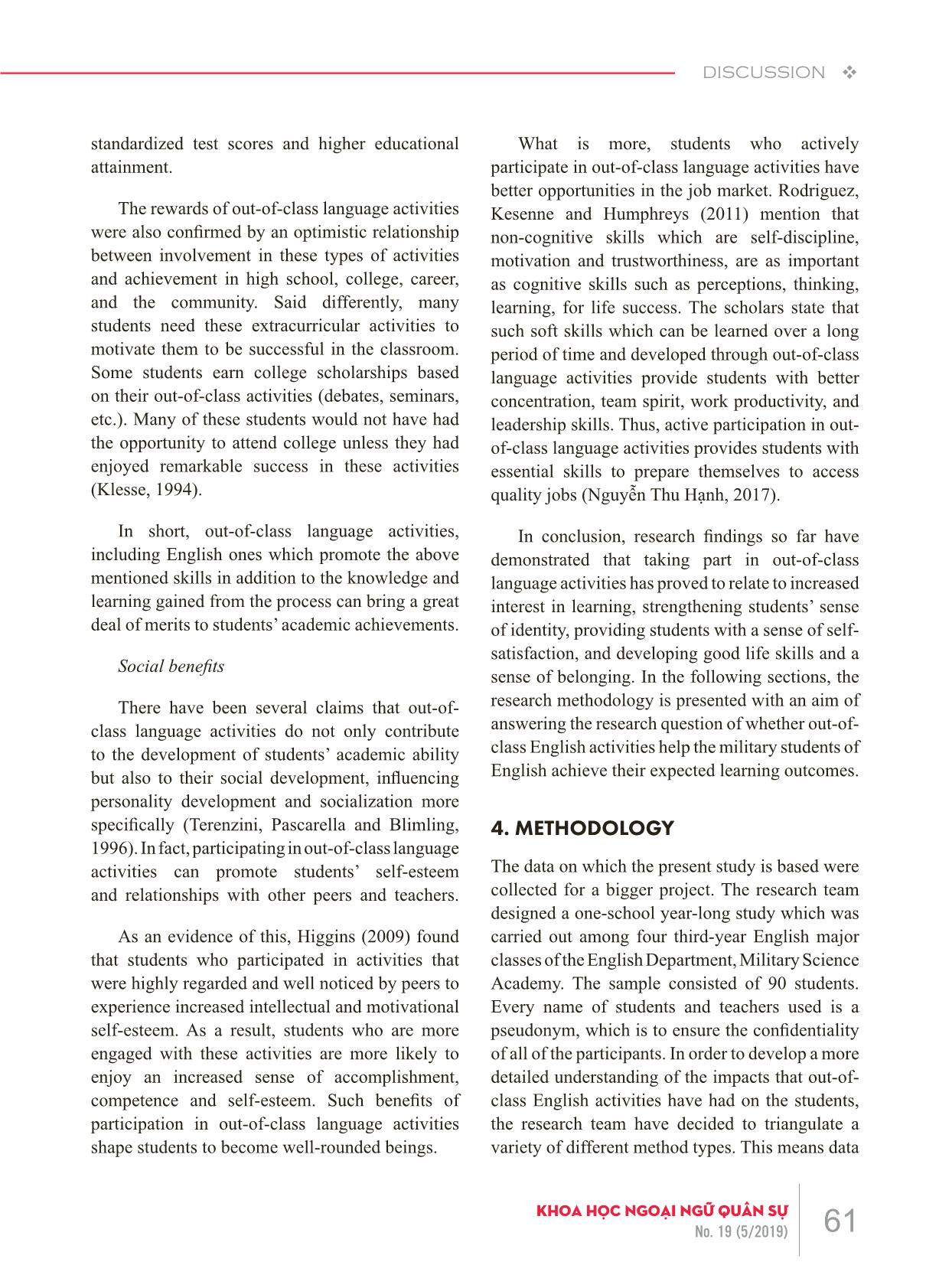
Trang 4
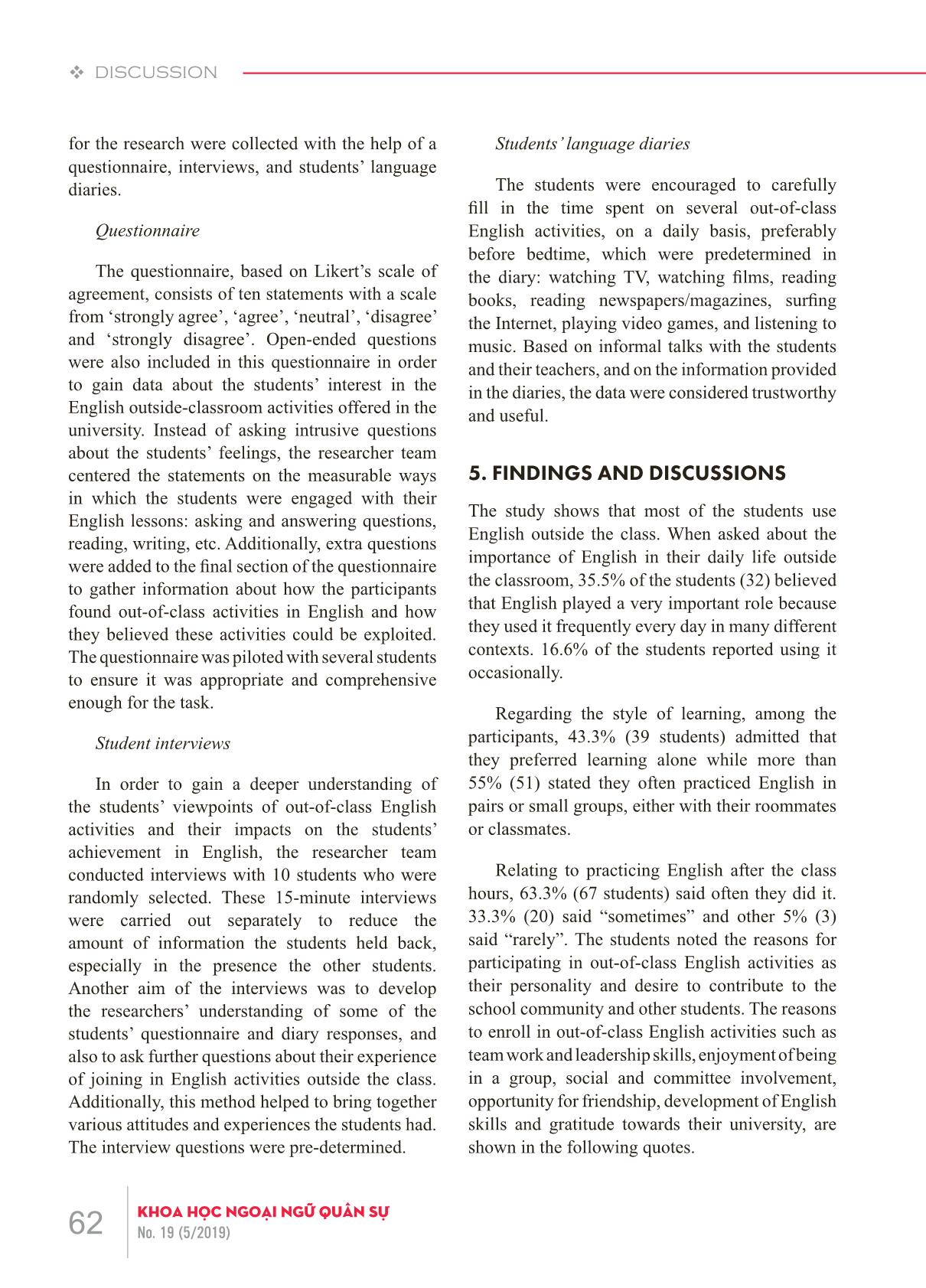
Trang 5
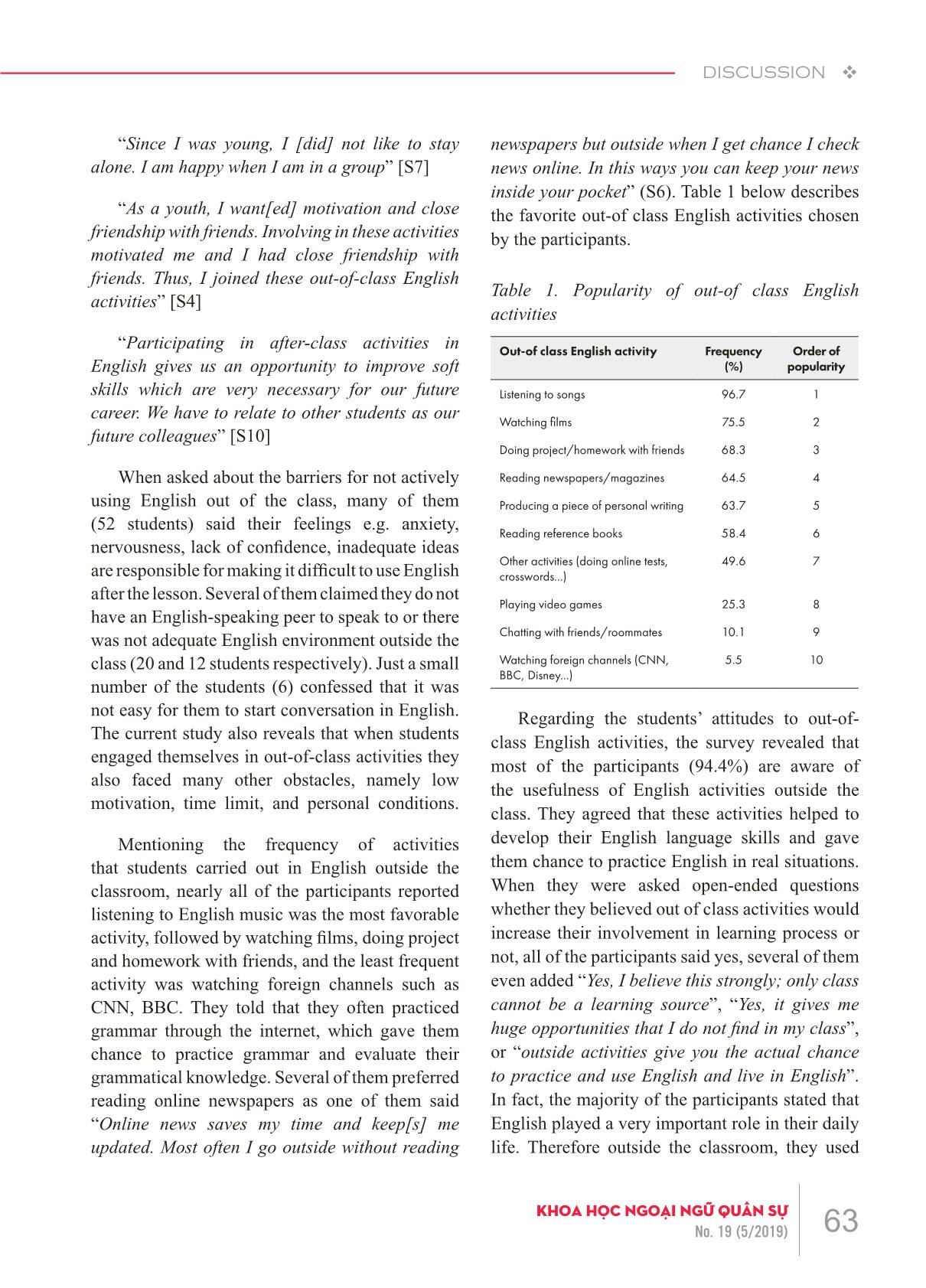
Trang 6
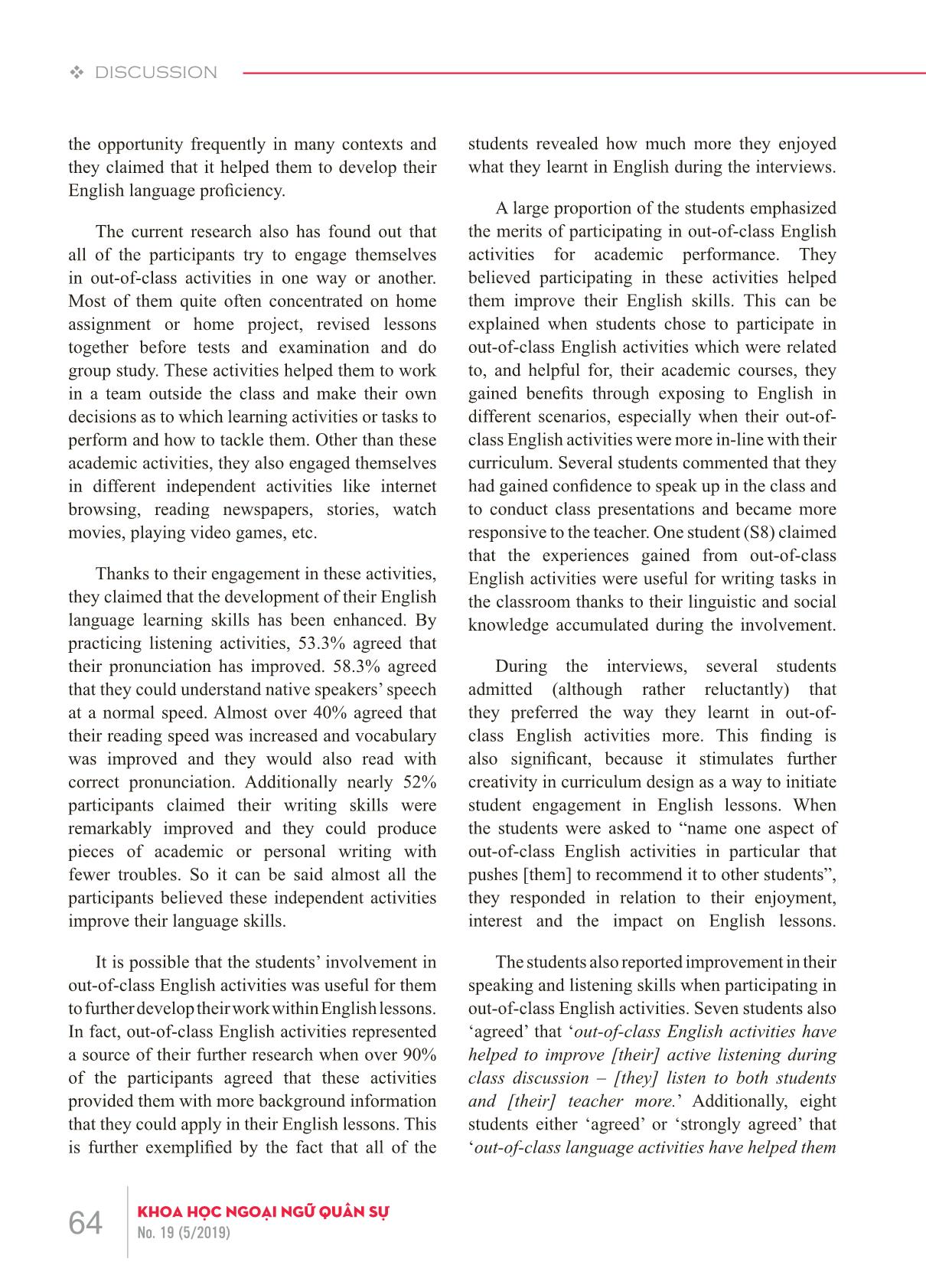
Trang 7
Bạn đang xem tài liệu "An investigation in to the impacts of out-of-class English activities on the English major students’ achievement at military science academy", để tải tài liệu gốc về máy hãy click vào nút Download ở trên
Tóm tắt nội dung tài liệu: An investigation in to the impacts of out-of-class English activities on the English major students’ achievement at military science academy
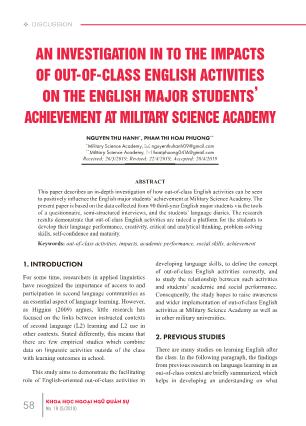
been several claims that out-of- class language activities do not only contribute to the development of students’ academic ability but also to their social development, influencing personality development and socialization more specifically (Terenzini, Pascarella and Blimling, 1996). In fact, participating in out-of-class language activities can promote students’ self-esteem and relationships with other peers and teachers. As an evidence of this, Higgins (2009) found that students who participated in activities that were highly regarded and well noticed by peers to experience increased intellectual and motivational self-esteem. As a result, students who are more engaged with these activities are more likely to enjoy an increased sense of accomplishment, competence and self-esteem. Such benefits of participation in out-of-class language activities shape students to become well-rounded beings. What is more, students who actively participate in out-of-class language activities have better opportunities in the job market. Rodriguez, Kesenne and Humphreys (2011) mention that non-cognitive skills which are self-discipline, motivation and trustworthiness, are as important as cognitive skills such as perceptions, thinking, learning, for life success. The scholars state that such soft skills which can be learned over a long period of time and developed through out-of-class language activities provide students with better concentration, team spirit, work productivity, and leadership skills. Thus, active participation in out- of-class language activities provides students with essential skills to prepare themselves to access quality jobs (Nguyễn Thu Hạnh, 2017). In conclusion, research findings so far have demonstrated that taking part in out-of-class language activities has proved to relate to increased interest in learning, strengthening students’ sense of identity, providing students with a sense of self- satisfaction, and developing good life skills and a sense of belonging. In the following sections, the research methodology is presented with an aim of answering the research question of whether out-of- class English activities help the military students of English achieve their expected learning outcomes. 4. METHODOLOGY The data on which the present study is based were collected for a bigger project. The research team designed a one-school year-long study which was carried out among four third-year English major classes of the English Department, Military Science Academy. The sample consisted of 90 students. Every name of students and teachers used is a pseudonym, which is to ensure the confidentiality of all of the participants. In order to develop a more detailed understanding of the impacts that out-of- class English activities have had on the students, the research team have decided to triangulate a variety of different method types. This means data 62 KHOA HỌC NGOẠI NGỮ QUÂN SỰNo. 19 (5/2019) v DISCUSSION for the research were collected with the help of a questionnaire, interviews, and students’ language diaries. Questionnaire The questionnaire, based on Likert’s scale of agreement, consists of ten statements with a scale from ‘strongly agree’, ‘agree’, ‘neutral’, ‘disagree’ and ‘strongly disagree’. Open-ended questions were also included in this questionnaire in order to gain data about the students’ interest in the English outside-classroom activities offered in the university. Instead of asking intrusive questions about the students’ feelings, the researcher team centered the statements on the measurable ways in which the students were engaged with their English lessons: asking and answering questions, reading, writing, etc. Additionally, extra questions were added to the final section of the questionnaire to gather information about how the participants found out-of-class activities in English and how they believed these activities could be exploited. The questionnaire was piloted with several students to ensure it was appropriate and comprehensive enough for the task. Student interviews In order to gain a deeper understanding of the students’ viewpoints of out-of-class English activities and their impacts on the students’ achievement in English, the researcher team conducted interviews with 10 students who were randomly selected. These 15-minute interviews were carried out separately to reduce the amount of information the students held back, especially in the presence the other students. Another aim of the interviews was to develop the researchers’ understanding of some of the students’ questionnaire and diary responses, and also to ask further questions about their experience of joining in English activities outside the class. Additionally, this method helped to bring together various attitudes and experiences the students had. The interview questions were pre-determined. Students’ language diaries The students were encouraged to carefully fill in the time spent on several out-of-class English activities, on a daily basis, preferably before bedtime, which were predetermined in the diary: watching TV, watching films, reading books, reading newspapers/magazines, surfing the Internet, playing video games, and listening to music. Based on informal talks with the students and their teachers, and on the information provided in the diaries, the data were considered trustworthy and useful. 5. FINDINGS AND DISCUSSIONS The study shows that most of the students use English outside the class. When asked about the importance of English in their daily life outside the classroom, 35.5% of the students (32) believed that English played a very important role because they used it frequently every day in many different contexts. 16.6% of the students reported using it occasionally. Regarding the style of learning, among the participants, 43.3% (39 students) admitted that they preferred learning alone while more than 55% (51) stated they often practiced English in pairs or small groups, either with their roommates or classmates. Relating to practicing English after the class hours, 63.3% (67 students) said often they did it. 33.3% (20) said “sometimes” and other 5% (3) said “rarely”. The students noted the reasons for participating in out-of-class English activities as their personality and desire to contribute to the school community and other students. The reasons to enroll in out-of-class English activities such as team work and leadership skills, enjoyment of being in a group, social and committee involvement, opportunity for friendship, development of English skills and gratitude towards their university, are shown in the following quotes. 63KHOA HỌC NGOẠI NGỮ QUÂN SỰNo. 19 (5/2019) DISCUSSION v “Since I was young, I [did] not like to stay alone. I am happy when I am in a group” [S7] “As a youth, I want[ed] motivation and close friendship with friends. Involving in these activities motivated me and I had close friendship with friends. Thus, I joined these out-of-class English activities” [S4] “Participating in after-class activities in English gives us an opportunity to improve soft skills which are very necessary for our future career. We have to relate to other students as our future colleagues” [S10] When asked about the barriers for not actively using English out of the class, many of them (52 students) said their feelings e.g. anxiety, nervousness, lack of confidence, inadequate ideas are responsible for making it difficult to use English after the lesson. Several of them claimed they do not have an English-speaking peer to speak to or there was not adequate English environment outside the class (20 and 12 students respectively). Just a small number of the students (6) confessed that it was not easy for them to start conversation in English. The current study also reveals that when students engaged themselves in out-of-class activities they also faced many other obstacles, namely low motivation, time limit, and personal conditions. Mentioning the frequency of activities that students carried out in English outside the classroom, nearly all of the participants reported listening to English music was the most favorable activity, followed by watching films, doing project and homework with friends, and the least frequent activity was watching foreign channels such as CNN, BBC. They told that they often practiced grammar through the internet, which gave them chance to practice grammar and evaluate their grammatical knowledge. Several of them preferred reading online newspapers as one of them said “Online news saves my time and keep[s] me updated. Most often I go outside without reading newspapers but outside when I get chance I check news online. In this ways you can keep your news inside your pocket” (S6). Table 1 below describes the favorite out-of class English activities chosen by the participants. Table 1. Popularity of out-of class English activities Out-of class English activity Frequency (%) Order of popularity Listening to songs 96.7 1 Watching films 75.5 2 Doing project/homework with friends 68.3 3 Reading newspapers/magazines 64.5 4 Producing a piece of personal writing 63.7 5 Reading reference books 58.4 6 Other activities (doing online tests, crosswords...) 49.6 7 Playing video games 25.3 8 Chatting with friends/roommates 10.1 9 Watching foreign channels (CNN, BBC, Disney...) 5.5 10 Regarding the students’ attitudes to out-of- class English activities, the survey revealed that most of the participants (94.4%) are aware of the usefulness of English activities outside the class. They agreed that these activities helped to develop their English language skills and gave them chance to practice English in real situations. When they were asked open-ended questions whether they believed out of class activities would increase their involvement in learning process or not, all of the participants said yes, several of them even added “Yes, I believe this strongly; only class cannot be a learning source”, “Yes, it gives me huge opportunities that I do not find in my class”, or “outside activities give you the actual chance to practice and use English and live in English”. In fact, the majority of the participants stated that English played a very important role in their daily life. Therefore outside the classroom, they used 64 KHOA HỌC NGOẠI NGỮ QUÂN SỰNo. 19 (5/2019) v DISCUSSION the opportunity frequently in many contexts and they claimed that it helped them to develop their English language proficiency. The current research also has found out that all of the participants try to engage themselves in out-of-class activities in one way or another. Most of them quite often concentrated on home assignment or home project, revised lessons together before tests and examination and do group study. These activities helped them to work in a team outside the class and make their own decisions as to which learning activities or tasks to perform and how to tackle them. Other than these academic activities, they also engaged themselves in different independent activities like internet browsing, reading newspapers, stories, watch movies, playing video games, etc. Thanks to their engagement in these activities, they claimed that the development of their English language learning skills has been enhanced. By practicing listening activities, 53.3% agreed that their pronunciation has improved. 58.3% agreed that they could understand native speakers’ speech at a normal speed. Almost over 40% agreed that their reading speed was increased and vocabulary was improved and they would also read with correct pronunciation. Additionally nearly 52% participants claimed their writing skills were remarkably improved and they could produce pieces of academic or personal writing with fewer troubles. So it can be said almost all the participants believed these independent activities improve their language skills. It is possible that the students’ involvement in out-of-class English activities was useful for them to further develop their work within English lessons. In fact, out-of-class English activities represented a source of their further research when over 90% of the participants agreed that these activities provided them with more background information that they could apply in their English lessons. This is further exemplified by the fact that all of the students revealed how much more they enjoyed what they learnt in English during the interviews. A large proportion of the students emphasized the merits of participating in out-of-class English activities for academic performance. They believed participating in these activities helped them improve their English skills. This can be explained when students chose to participate in out-of-class English activities which were related to, and helpful for, their academic courses, they gained benefits through exposing to English in different scenarios, especially when their out-of- class English activities were more in-line with their curriculum. Several students commented that they had gained confidence to speak up in the class and to conduct class presentations and became more responsive to the teacher. One student (S8) claimed that the experiences gained from out-of-class English activities were useful for writing tasks in the classroom thanks to their linguistic and social knowledge accumulated during the involvement. During the interviews, several students admitted (although rather reluctantly) that they preferred the way they learnt in out-of- class English activities more. This finding is also significant, because it stimulates further creativity in curriculum design as a way to initiate student engagement in English lessons. When the students were asked to “name one aspect of out-of-class English activities in particular that pushes [them] to recommend it to other students”, they responded in relation to their enjoyment, interest and the impact on English lessons. The students also reported improvement in their speaking and listening skills when participating in out-of-class English activities. Seven students also ‘agreed’ that ‘out-of-class English activities have helped to improve [their] active listening during class discussion – [they] listen to both students and [their] teacher more.’ Additionally, eight students either ‘agreed’ or ‘strongly agreed’ that ‘out-of-class language activities have helped them
File đính kèm:
 an_investigation_in_to_the_impacts_of_out_of_class_english_a.pdf
an_investigation_in_to_the_impacts_of_out_of_class_english_a.pdf

